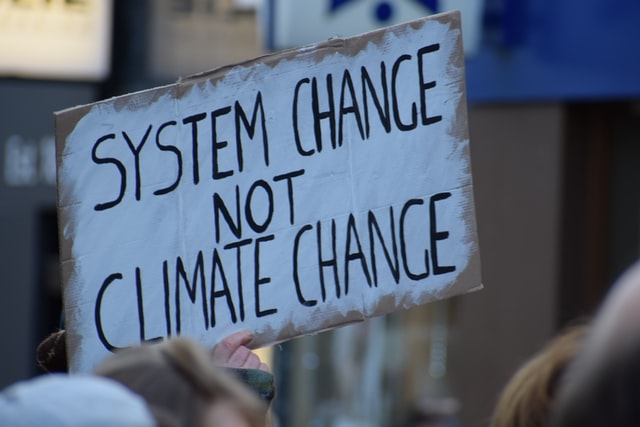Liberal environmentalism is in a perpetual crisis; it is unsurprising that the crisis is a chance to escape the individualist traps with which it is riddled.
A pamphlet I recently read illustrates well where boundaries of such environmentalism lie. Two points were particularly illustrative and left ample space for Marxist-Leninist education: the unimaginable scale of the climate crisis, and the effect of small contributions to a large change.
“The magnitude of the problem is at the very limits of thinkability and anyone engaging with it is liable to find themselves confronted by a tangle of contradictions and impasses”, writes the pamphlet author. In an analysis devoid of materialist lens, this is a discouraging statement. In material reality, the climate crisis challenges “the limits of thinkability” when subjected to painstaking separation from the capitalist mode of production. Trying to explain the climate crisis without political economy is as hard as explaining the concept of the tide without mentioning the Moon: we would have to stop at calling it a mysterious phenomenon and develop very precise models for predicting it, but without actually understanding any of it.
When seen as one extreme manifestation of capitalism, the climate crisis not only makes perfect sense, but also obviously admits no solution which leaves capitalism in its place. It is in this light that the contradictions and impasses are to be looked at as well. Capitalism has long been diagnosed with irreconcilable contradictions between the character of the productive forces and the relations of production resulting in crises. Dialectical approach to all things recognises contradictions within their very essence; it is the task of the class struggle to, in case of capitalism, expose the contradictions and unravel them.
This task brings us to the second learning opportunity. The pamphlet closes with the following statement:
“While each on its own may seem insignificant, perhaps it isn’t impossible to imagine that myriad mini-actions could culminate in a critical mass (…) Once enough of us have had ‘the ecological thought’ our combined actions may start to surge in more ecologically feasible directions. Somewhat idealistic, it hardly needs to be said, but at least this kind of openness to manifold possibilities might enable people to begin to find the kinds of action that suit them.”
The first sentence is at the brink of acknowledging materialist dialectics: indeed, rapid and abrupt qualitative change happens as the natural result of an accumulation of imperceptible and gradual quantitative changes. There is nothing idealistic about this vision, it is solid materialist perspective—what makes the quote above idealistic is the refusal of organising. It is the magical thinking where if enough of “us” (who is “us”?) somehow align our actions, the world changes. It is not by ideals or vague good wishes that we, the communists, reach change, but by understanding the mechanics of the society and its contradictions. Refusing to acknowledge the need for organising and understanding the world we organise in helps nobody. Those who refuse to understand the roots of the climate crisis (and other crises), and choose to put hope in goodwill of the masses (and oftentimes have a bourgeois idea who those masses are) do not stand a chance in face of the capitalist metabolism devouring nature and people.






